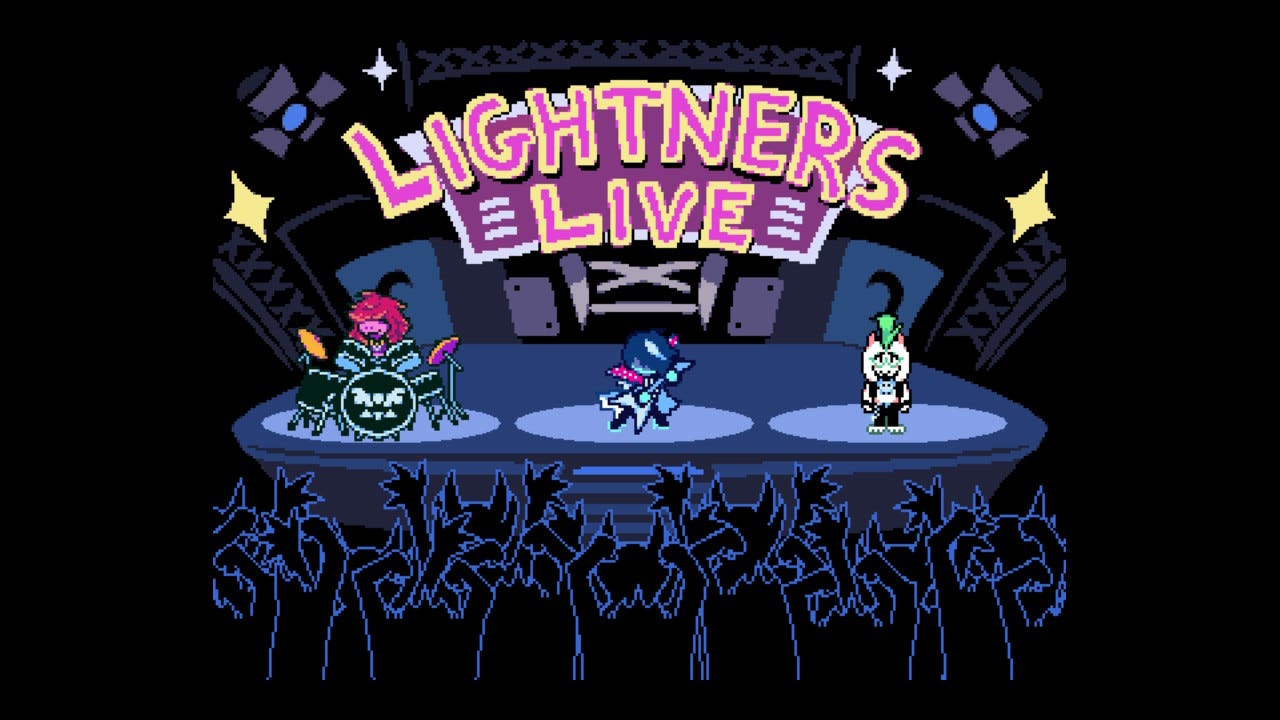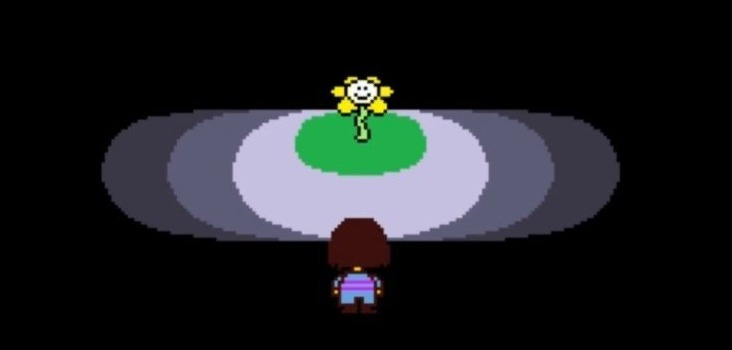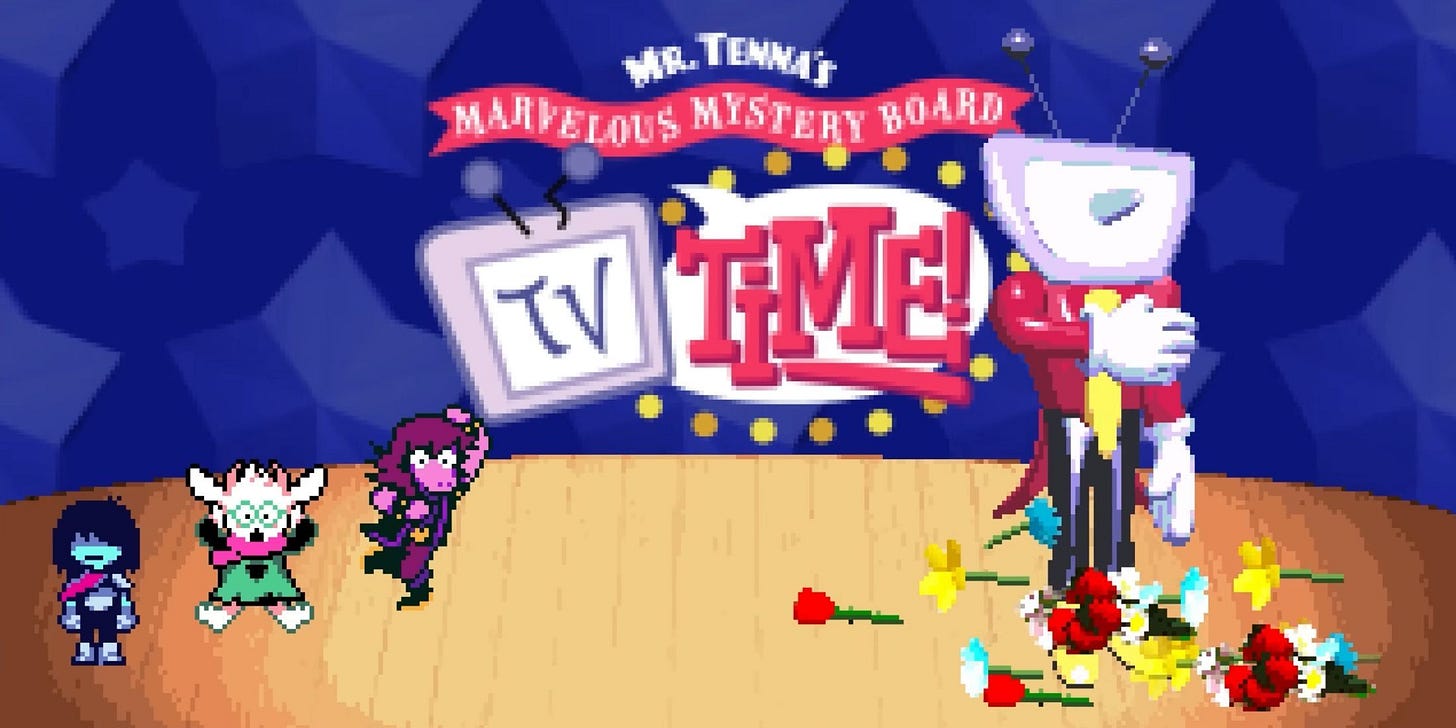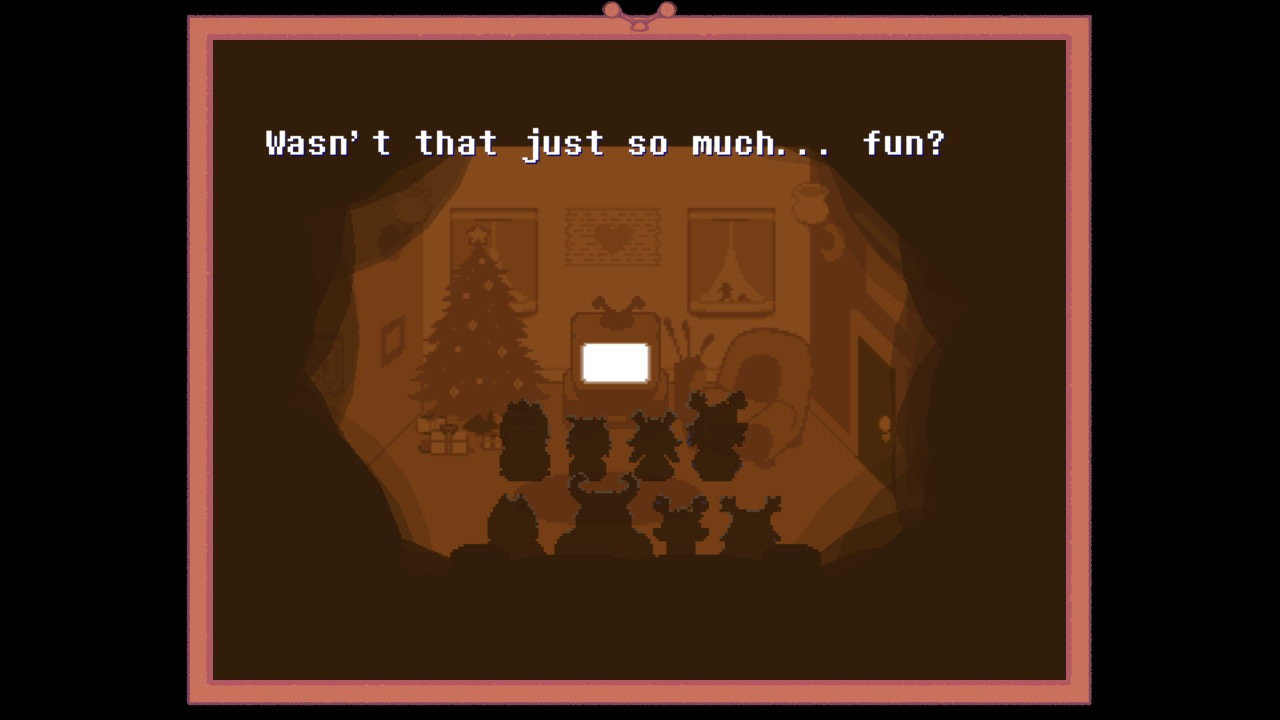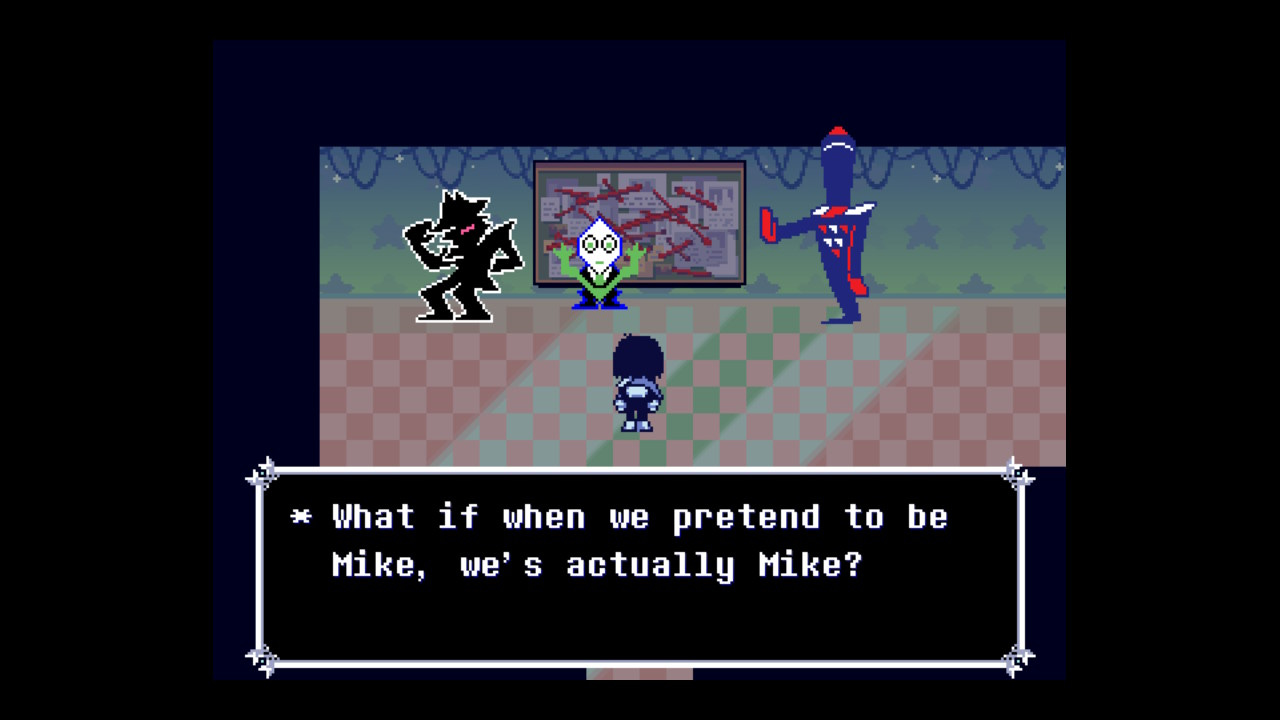Review: DELTARUNE CHAPTERS 3 + 4 ONLY. Do NOT ask about 1 + 2, I don't remember!
Played On: Nintendo Switch OLED as the artist intended (How do you say OLED out loud? Please leave a comment.)
Difficulty: There are no options, making it a Soulslike
Finished: Impossible at this time as only 4 chapters are available.
Spoilers: This review has been written according to the Joshcv A.I.R.M.A.P. Style Guide and as such necessarily includes discussions of the end of the game, a minimum of 3 personal anecdotes, one of which is about a time I cried, all set along the backdrop of rising authoritarianism and/or fascism.
Rating on the A.I.R.M.A.P Scale: 3 and 4 out of 7
In 2016, retired internet theater kid Matpat gifted a copy of Undertale to Pope Francis. Since, like me, Matpat doesn’t think about games like a normal human person, I assume he came to the same conclusion I did about Undertale’s view of morality. It coincides neatly with Catholicism: do good, be rewarded. Do bad, face eternal damnation. Realize you made a mistake and try to start the game over, a demonic flower reassures you your actions have been remembered and there’s nothing you can do to erase your sins.
If you’re unfamiliar, Undertale has several endings, the “true” of which is locked behind cleverly avoiding all combat for the entire game. Even reloading an old save after killing an enemy will lock you out of the true ending as the game, by way of multiversal god-being Flowey, remembers what you did in the alternate timeline before resetting.
There are at least two such beings (not including the player character) who will pass judgement on the player based on their actions in Undertale. The appropriate ending is awarded based on if they spared or killed the innocent monsters within. This is the central conceit of Undertale which makes the proud proclamation of Deltarune’s single ending so notable. We can extrapolate that there is meaning to this piece of marketing copy based on the opposites prevalence to the predecessor. The twist was more than just a subversion of turn based RPG tropes, it was a morality system either rewarding or punishing the player by the end. Every combat encounter in Undertale can be completed through specific actions that appease your opponent, convincing them they're not in danger. This mechanic persists in Deltarune, but this time we know there is no “true” ending to strive for. The outcome will be the same whether we kill or spare the "enemies" we meet along the way.
You can play through episodes 1 and 2 of Deltarune for free and now 3 and 4 as the first half of the overall story. Having played through the available chapters, I find myself torn between two ideas:
If we know there is only one ending, then our actions are truly our own. We are not kind simply for the hope of some reward, but for the sake of kindness. Likewise, cruelty becomes more sinister as there is no different end to attempt to justify the means.
A preordained fate or divine plan removes agency, especially if someone knows their fate. Each act becomes an attempt to subvert that fate only to find that, too has been written.
These were my thoughts before the release of chapters 3 and 4. I was shocked to find that these new additions would dive into the topic head on and answer my ultimate question: who is God in Deltarune?
There Are No Reflections In TV Static
From the beginning, Deltarune sets itself apart from its predecessor. The player is asked to enter their name for the main character. The game quickly destroys the words and informs you this is not your story, but the story of Kris. Kris' fate is already decided. We meet Susie at school, a tough bully type who's simultaneously picked on and hated by everyone. Her teachers have no faith in her and the only one who ever gives her any kind of positive attention is Toriel, Kris' mom. Anyway, one thing leads to another and Kris and Susie get pulled through a portal to the Dark World. School kid stuff. There, they meet Ralsei, a mysterious Dark World prince with magic powers who tells them about the prophecy. That the three of them were meant to save the world. Chapters 1 and 2 happen, Kris might be evil at the end or something and now finally we have chapters 3 and 4.
Chapter 3 smash cuts right into the action in a somewhat disorienting way. Most of the Dark World tone and style of the first two chapters is absent, replaced with a live TV set. I mean that in every way it can be interpreted. Kris, Susie, and Ralsei are on a TV set for the filming of a live game show complete with an audience AND there is a CRT box TV set that is alive and the host of the show. The entire chapter takes place here as Tenna, the live TV, hosts us through several physical challenges, quizzes, and performances in an attempt to keep the show going. Forever.
Toby Fox, the lead developer, returns his signature humor and style to these new chapters, solidifying his place as one of the gaming industries most unique voices. As a writer, developer, and composer, Fox belongs in the greater conversation of video game auteurs. As always, the turn based combat offers immense variety, each "enemy" having their own unique moves to be dodged and puzzles for completing combat without doing any damage (assuming you aren't just fighting your way through, which is also an option). Each enemy talks through encounters as well, giving hints to their personalities and how best to show them kindness or otherwise ease their fear around you. When it comes to our search for Deltarune’s God, Toby Fox seems like a strong place to start as the actual creator of the world. He’s on the list.
Between challenge rounds, we explore the green room, and try to figure out Tenna's whole deal while meeting some of his reluctant staff. Tenna eventually reminisces about how nice it was back when Kris and his brother and mom would all sit around him to watch TV together and how they no longer do. Susie vows to ask around town when they get back to the light world to see if anyone wants a CRT. Deltarune itself having an aspect ratio of 4:3, we know as the player the importance of the TV. Tenna's grip on the past, however does put him at odds with his staff, and they all eventually turn on him. His leadership starts to look more and more dictatorial, keeping them there against their will. Even his most trusted partner, Mike, the show's producer who we never actually get to see, leaves him at the end of the chapter. This is when Tenna truly realizes the error of his ways. If even Mike would leave him, something must be wrong. Mike is a trusted friend and partner, but friendship goes both ways. Trust is earned, and friendships can be lost.
Chapter 3 ends when we meet The Knight, a shadow creature who created the fountain to this Dark World, and threatens to destroy it and the world of light. If The Knight has the power to destroy both worlds, could this be the God we’re looking for?
Tenna, having lost his best friend, Mike, helps the party in the end and joins their community of spared Dark World inhabitants. He reveals he was tasked with holding them off and hiding Toriel from them by The Knight who offered to return him to the glory days of when Kris’ family would watch TV together. Tenna, in the end, just wanted to be useful.
The Dark Has Never Been Darker with OLED!
I didn't expect the next chapter to confirm my suspicions about morality in Deltarune vs Undertale so exactly. Chapter 4 begins back in the Light World with Toriel taking Kris and Susie to church where she is a regular member. She leads the choir there and has friends she socializes with after the service. Susie isn’t entirely pleased to be going to church, but goes along out of respect for Toriel.
I have fond memories of going to church as a kid. Every single one of them had to do with trying not to laugh with my friends despite the divine power of the church to make everything 100 times funnier (approximately). Lord forbid someone's shoe make a fart sound, by accident or on purpose. The true test of strength for a group of 10 year old boys. I once brought a pen with me in my pocket and while twirling and flipping it around to entertain myself, I accidentally flung it straight into my friend's face. I think this is tied for the hardest I've ever laughed in my life to this day. So when Susie asks Kris if they have anything in their pocket to do during the service, I felt that.
Faith and fate drive the three heroes through the latest chapter, finding in the new Dark World stained glass stations telling the prophecy which they have been written into as the heroes. They find this prophecy has predicted everything they've already done so far, and Ralsei has studied the entire thing to the end. Ralsei knows what will happen, and becomes increasingly nervous as they progress, afraid of what will happen when his friends see how the story ends. When this is revealed, Susie tells him she doesn't care what happens as long as they're all together. They both decide, in their own ways, they will try to defy fate. Ralsei believes in the prophecy, but hopes fate can be changed. Susie doesn't believe in it at all, saying it would never happen because of their friendship.
Kris seems more torn on his faith. I thought this story wasn't supposed to be about me, TOBY!
After the service at the beginning of the chapter, you can speak to the various churchgoers. One of them will tell you they're not too religious, "but I just, like, love coming here." The churchgoer loves the sense of community it provides, a togetherness that all of us need in one way or another. Is faith just the organized religions as we know them? Can faith, or a type of faith, exist in your TV, in a cyber's world, in our dreams? Or is this just worship?
Deltarune posits that these things become true faith when they are shared. When Kris and their family gather around the TV together, when dreams are shared and supported, when the community meets on Sunday. When people come together, maybe they can even defy a strongly held conviction. God, then becomes an even blurrier figure in these scenarios. Each chapter so far has had a central “villain” that represented one of these things: a TV, the internet, a literal kingdom of cards. Each of these took on tyrannical roles in their respective chapters, corrupted by The Knight and his false promises to them. Tenna, King, and Queen all come to realize The Knight is not the God they were searching for, and none of them would be the God they hoped.
Chapter 4 ends with a boss fight against a gargantuan figure, the Titan, an unfeeling, consciousless being created only to destroy. Through great effort, and the help of some friends, the team subdues the monster and the end of the prophecy is revealed to Susie. What she sees upsets her to the point of shattering the stained glass it’s written on. We never get to see it, only her bloodied hand in the aftermath. Ralsei finally admits his fear about the prophecy, that holding it in and being the only one who knows has taken its toll. Susie reassures him that as long as they’re all together, they’ll never let the horrible end of the prophecy come to pass.
Help, I Can’t See Anything Without My Xreal AR Glasses
Through playing, I found not attacking enemies to be incredibly easy. I don’t even consider the option of fighting when playing Undertale or Deltarune. It feels like that’s just how the games are meant to be played. There are times in Deltarune, however, when you have no option but to fight, like the Titan boss at the end of chapter 4. The black and white morality of Undertale isn’t exactly present in Deltarune. There are two sides even to Kris, the player character. Kind and cruel.
I was left with no answers to my question. There would be 3 more chapters where I assumed I would learn more, but just as I was going to bed the night I had finished and allowed myself to look up what people were saying about the game, I saw a tweet from Toby Fox. He advised to reload your last save after completing the game one more time. Surely one little scene hidden in a secret area wouldn’t be what I was looking for. Right?
In that secret area after the chapter has ended, we finally meet Mike, Tenna's most trusted friend and producer. We find out that Mike is not Mike at all, but 3 members of Tenna's staff all pretending to be Mike because they kept hearing about how great this Mike guy was. None of them know if there ever really was a Mike to begin with or how the "idea" of Mike even started. For all they know, there was never a Mike and they were the only Mikes there ever were, carrying out the actions and duties of the idea that is "Mike."



